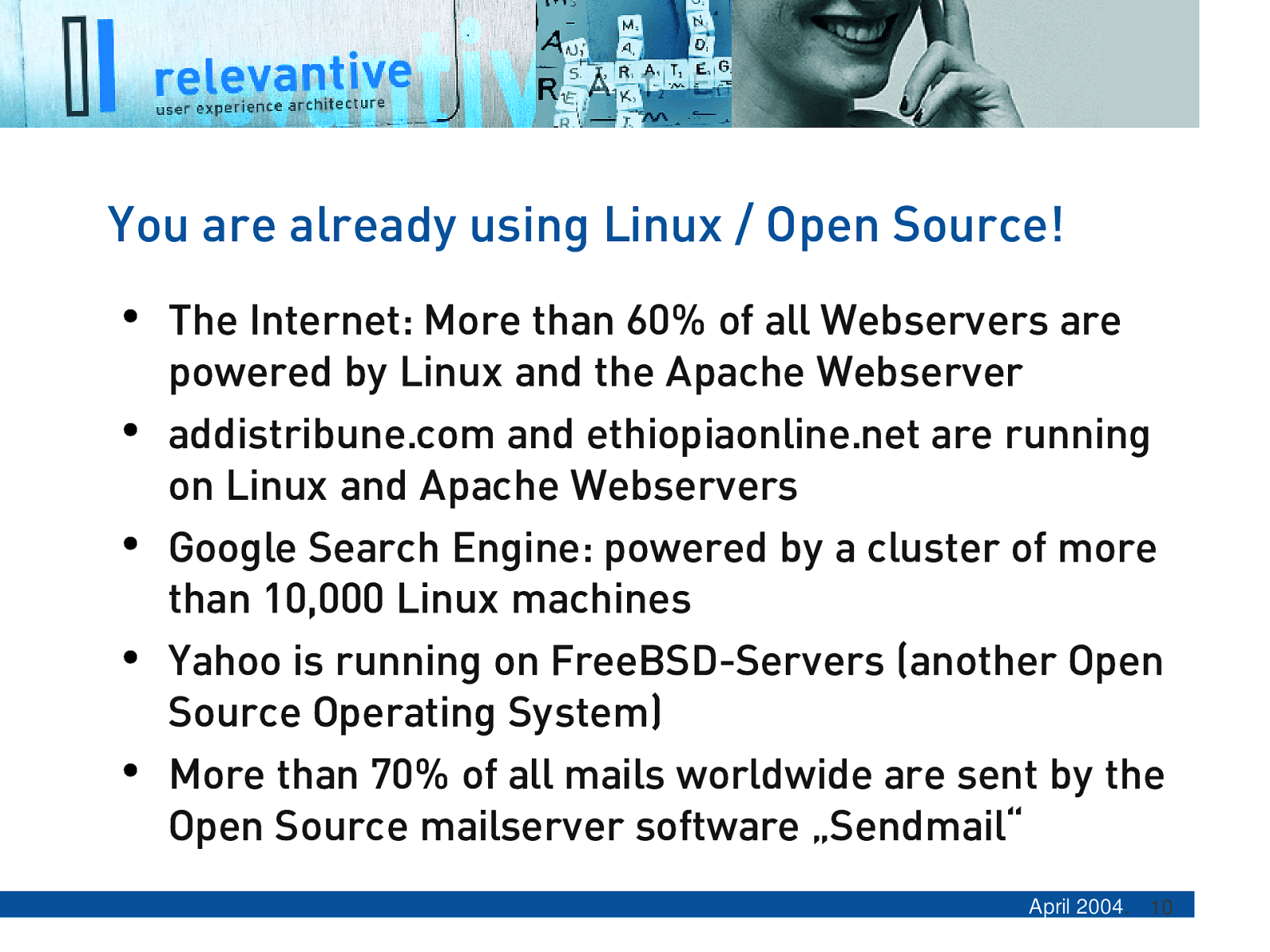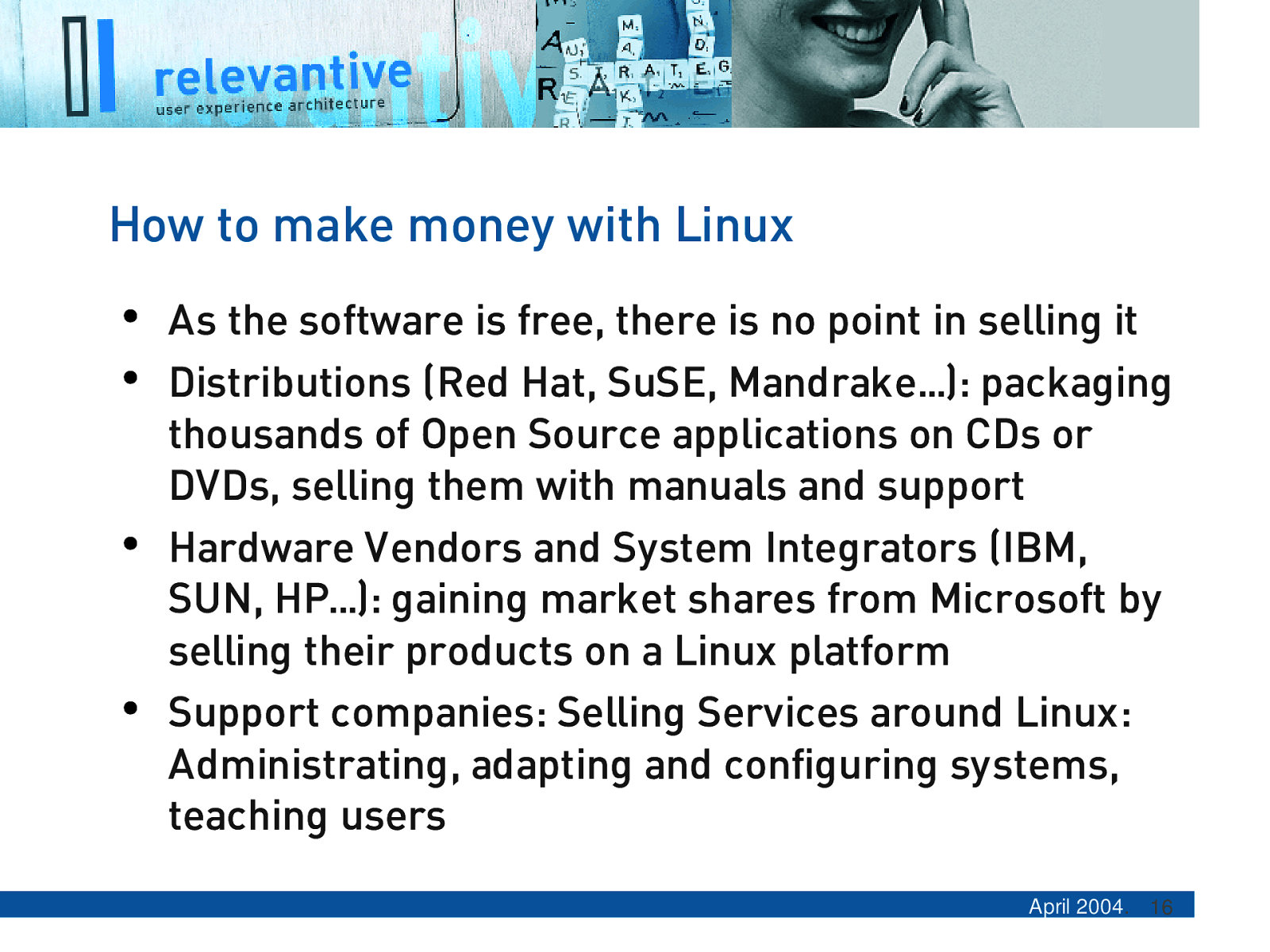Folie Titel Information Technology and Development Connecting Ethiopia to the Internet Age by Free and Open Source Software April 2004.
Slide 1

Slide 2

In this presentation, you will learn … ● ● ● ● ● what Open Source / Linux is what the advantages over commercial software are what Open Source Programs look like why Open Source / Linux is a big chance for Ethiopia where you can get Linux, more resources and further information. April 2004. 2
Slide 3

Introduction ● ● ● About us: German Company relevantive AG specialized in making software more usable for nontechnical users What we do: Consulting German administrations and companies in migrating from Windows to Linux Why are we here: Promoting the opportunities of Linux and Open Source Software for Ethiopia April 2004. 3
Slide 4

What is Linux? • Operating System • Server Applications (Web, Mail, File, SSH, FTP, Databases…) • Development Tools (IDEs, Compilers, Interpreters…) • Server Applications (Web, Mail, File, SSH, FTP, Databases… • Desktop Applications (Office, Mailclient, Webbrowser, Multimedia, Personal Information Management…) • Free Software • Open Source Software April 2004. 4
Slide 5

What is Open Source Software? ● ● ● Software is made of code (the source code) Code may be closed (as in proprietary software like Microsoft Windows) Open Source Software: Everybody can read the code, copy the code, change the code, adapt it to one’s needs (if one is able of programming) April 2004. 5
Slide 6

What is Free Software? ● ● ● Free of Cost Nobody „owns“ it Free to copy and distribute April 2004. 6
Slide 7

Why is proprietary software closed? ● ● ● Companies invest money in programmers to produce software Companies want to sell their software products Companies do not want others to know about business secrets in the code April 2004. 7
Slide 8

Why is Open Source Software open? ● ● ● Programmers ● Learn about good programming from each other by looking into the code ● Join a large international community that contributes to their software ● Gain knowledge and tools in sharing them with others Security holes get fixed very fast because everybody can check the code for exploits Very fast development April 2004. 8
Slide 9

The GNU Public License (GPL) ● ● Assures that Open Source Software stays open You may sell Open Source Software, but there always has to be a free copy of its code on the internet April 2004. 9
Slide 10

You are already using Linux / Open Source! ● ● ● ● ● The Internet: More than 60% of all Webservers are powered by Linux and the Apache Webserver addistribune.com and ethiopiaonline.net are running on Linux and Apache Webservers Google Search Engine: powered by a cluster of more than 10,000 Linux machines Yahoo is running on FreeBSD-Servers (another Open Source Operating System) More than 70% of all mails worldwide are sent by the Open Source mailserver software „Sendmail“ April 2004. 10
Slide 11

Where does Linux come from? ● ● ● 1991: the Finnish student Linus Torvalds wants to learn something about operating systems As he cannot learn from the UNIX sources (since they are closed), he starts writing his own operating system He announces this on an Internet newsgroup and invites people to join his efforts April 2004. 11
Slide 12

Where is Linux / Open Source today? ● ● ● ● ● Worldwide developer community of more than 15.000 people More than 6.000 applications available Available in about 100 languages Used in business critical contexts Used in embeded devices, as digital VCRs, mobile phones, … April 2004. 12
Slide 13

Why are developers doing this? ● ● Programming for free in their spare time: Because they are interested in good software, they can learn from each other. They gain reputation in the open source community by developing good code and innovative software April 2004. 13
Slide 14

Why are companies doing this? ● ● ● ● ● ● Paying programmers to develop open source software (which they have to give away for free): They get the power of the whole community They get very good, motivated developers „open-sourcing“ their already developed software (SUN: Open Office, AOL: Mozilla) They gain market shares by giving their software for free They get new innovations from the community April 2004. 14
Slide 15

Who is using Open Source Software? ● ● ● Companies: UniLever, IBM, DaimlerChrysler, McDonalds, … Countries: Germany, Brazil, China, Japan, India, France, … Open Source Projects in Africa: ● ● ● ● SchoolNet Namibia Luganda Translation Project Women of Uganda Network South African Linux Distribution (impi) April 2004. 15
Slide 16

How to make money with Linux ● ● ● ● As the software is free, there is no point in selling it Distributions (Red Hat, SuSE, Mandrake…): packaging thousands of Open Source applications on CDs or DVDs, selling them with manuals and support Hardware Vendors and System Integrators (IBM, SUN, HP…): gaining market shares from Microsoft by selling their products on a Linux platform Support companies: Selling Services around Linux: Administrating, adapting and configuring systems, teaching users April 2004. 16
Slide 17

What are the advantages for Ethiopia? ● ● ● ● ● Free of cost Reuse of older hardware possible Localization, Translation, Adaption Knowledge stays inside the country Security April 2004. 17
Slide 18

Why is Linux more secure? ● ● ● ● Advanced Multi-User System: nobody can execute programs with administrator rights Nothing is executed automatically, the user is always asked The applications inform the user about possible security risks of his/her actions Open source code: everybody can identify security risks by looking inside the code – and lots of people do this, and also fix the security holes! April 2004. 18
Slide 19

Thank you for your attention! April 2004. 19